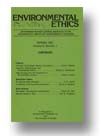|
news and notes |
|
1.
|
Environmental Ethics:
Volume >
9 >
Issue: 1
NEWS AND NOTES
view |
rights & permissions
| cited by
|
|
|
|
|
features |
|
2.
|
Environmental Ethics:
Volume >
9 >
Issue: 1
Karen J. Warren
Feminism and Ecology:
Making Connections
abstract |
view |
rights & permissions
| cited by
The current feminist debate over ecology raises important and timely issues about the theoretical adequacy of the four leading versions of feminism-liberal feminism, traditional Marxist feminism, radical feminism, and socialist feminism. In this paper I present a minimal condition account of ecological feminism, or ecofeminism. I argue that if eco-feminism is true or at least plausible, then each of the four leading versions of feminism is inadequate, incomplete, or problematic as a theoretical grounding for eco-feminism. I conclude that, if eco-feminism is to be taken seriously, then a transformative feminism is needed that will move us beyond the four familiar feminist frameworks and make an eco-feminist perspective central to feminist theory and practice.
|
|
|
|
|
3.
|
Environmental Ethics:
Volume >
9 >
Issue: 1
Michael E. Zimmerman
Feminism, Deep Ecology, and Environmental Ethics
abstract |
view |
rights & permissions
| cited by
Deep ecologists have criticized reform environmentalists for not being sufficiently radical in their attempts to curb human exploitation of the nonhuman world. Ecofeminists, however, maintain that deep ecologists, too, are not sufficiently radical, for they have neglected the cmcial role played by patriarchalism in shaping the cultural categories responsible for Western humanity’s domination of Nature. According to eco-feminists, only by replacing those categories-including atomism, hierarchalism, dualism, and androcentrism - can humanity learn to dweIl in harmony with nonhuman beings. After reviewing the eco-feminist critique both of reform environmentalism and of deep ecology, I sketch a critical dialogue between eco-feminism and deep ecology.
|
|
|
|
|
4.
|
Environmental Ethics:
Volume >
9 >
Issue: 1
Frank B. Golley
Deep Ecology from the Perspective of Environmental Science
abstract |
view |
rights & permissions
| cited by
Deep ecology is examined from the perspective of scientific ecology. Two norms, self-realization and biocentric equality, are considered central to deep ecology, and are explored in brief. Concepts of scientific ecology that seem to form a bridge to these norms are ecological hierarchical organization, the exchange of energy, material and information, and the development of species within ecosystems and the biosphere. While semantic problems exist, conceptually it appears that deep ecology norms can be interpreted through scientific ecology.
|
|
|
|
|
discussion papers |
|
5.
|
Environmental Ethics:
Volume >
9 >
Issue: 1
G. E. Varner
Do Species Have Standing?
abstract |
view |
rights & permissions
| cited by
In arecent article Christopher D. Stone has effectively withdrawn his proposal that natural objects be granted legal rights, in response to criticism from the Feinberg/McCloskey camp. Stone now favors a weaker proposal that natural objects be granted what he calls legal considerateness. I argue that Stone’s retreat is both unnecessary and undesirable. I develop the notion of a de facto legal right and argue that species already have legal rights as statutory beneflciaries of the Endangered Species Act of 1973. I conclude that granting certain nonhuman natural entities legal rights is both more important and less costly than Stone and his critics have realized, and that it is not Stone’s original proposal which needs rethinking, but the concept of interests at work in the Feinberg/McCloskey position.
|
|
|
|
|
6.
|
Environmental Ethics:
Volume >
9 >
Issue: 1
Steven E. Edwards
In Defense of Environmental Economics
abstract |
view |
rights & permissions
| cited by
The appropriateness of economic valuations of the natural environment is defended on the basis of an objective analysis of individuals’ preferences. The egoistic model of “economic man” substantiates economic valuations of instrumental values even when markets do not exist and when consumption and use are not involved. However, “altruistic man’s” genuine commitment to the well-being of others, particularly wildlife and future generations, challenges economic valuations at a fundamental level. In this case, self-interest and an indifference between states of the world are secondary and undefined respectively, since preferences are not based on tradeoffs between the welfare of others and self. The appropriateness of economic valuations rests solely with the empirical validity of the assumptions that give rise to economic man.
|
|
|
|
|
book reviews |
|
7.
|
Environmental Ethics:
Volume >
9 >
Issue: 1
Robert W. Loftin
Ron Baker: The American Hunting Myth
view |
rights & permissions
| cited by
|
|
|
|
|
8.
|
Environmental Ethics:
Volume >
9 >
Issue: 1
Paul B. Thompson
Nicholas Rescher: Risk
view |
rights & permissions
| cited by
|
|
|
|
